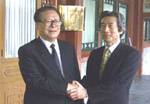 |
Japanese PM's Visit to Lugou Bridge Meaningful: Jiang

President Jiang Met with Visiting Japanese PM
Chinese President Jiang Zemin told visiting Japanese Prime Minister Junichiro Koizumi Monday that his visit to Lugou Bridge earlier in the day was a " meaningful action" which would improve bilateral ties.
After he visited the bridge and the nearby Memorial Hall of the War of Resistance Against Japanese Aggression, Koizumi expressed " heartfelt apology and mourning" for the Chinese people who died in Japan's aggressive war half a century ago.
Lugou Bridge, also known as the Marco Polo Bridge, is a symbol in China and marks the beginning of Japan's invasion of China which resulted in 35 million Chinese casualties.
"China welcomes the visit of Prime Minister Koizumi who has the will to improve bilateral relations," Jiang said.
He noted Koizumi had expressed positive comments on China-Japan relations several times since assuming the post of Prime Minister.
But "the important thing is action, and your action this time to visit the Memorial Hall is meaningful," Jiang said, stressing that correctly treating historical issues is the political foundation for Sino-Japanese relations and the starting point for looking to the future.
"I have been consistently advocating the principle of taking history as a mirror and looking forward to the future in handling China-Japan relations," he said.
The bilateral ties have experienced high and low points, and the low points are always linked to the issue of history textbooks and Yasukuni Shrine, Jiang said.
The Yasukuni Shrine keeps the sacrificial tablets of Class-A war criminals, and if Japanese leaders go there to worship, it creates a serious problem, he said, adding that "Asian people are very sensitive to Japan's possible repetition of its aggressive history."
On the history textbook issue, Jiang stressed that in the long run for the promotion of friendship between the two nations, it is necessary to tell the true story to the younger generation.
Next year will mark the 30th anniversary for the normalization of China-Japan relations, Jiang said, noting that he expects both sides will hold commemoration activities to improve mutual understanding and friendship between the two nations.
Koizumi reiterated his "heartfelt apology and mourning" for the Chinese people who died in the war, promising that Japan would learn from its deep introspection into history and would not let such a war reoccur.

In This Section

|